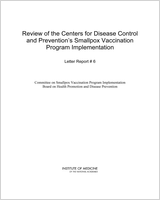NCBI Bookshelf. A service of the National Library of Medicine, National Institutes of Health.
Institute of Medicine (US) Committee on Smallpox Vaccination Program Implementation. Review of the Centers for Disease Control and Prevention's Smallpox Vaccination Program Implementation: Letter Report # 6. Washington (DC): National Academies Press (US); 2004.

Review of the Centers for Disease Control and Prevention's Smallpox Vaccination Program Implementation: Letter Report # 6.
Show detailsRecommendation 1:
The committee recommends that all federal entities concerned with bioterrorism preparedness (e.g., CDC, HRSA, ODP) should more actively coordinate guidance and funding activities. Federal agencies should also work together to develop mechanisms that facilitate coordination and collaboration among their grantees at the state and local levels. Federal efforts should include the clarification of primary responsibility and authority in bioterrorism events, to ensure that CDC can fulfill its unique role as the nation's public health agency.
Recommendation 2:
The committee recommends that CDC should collaborate with all of its partners to strengthen preparedness by applying research findings and experience in public health emergency response, bioterrorism preparedness, and disaster management. In order to strengthen the evidence base for public health preparedness, CDC should:
- Strengthen the link between public health research and practice;
- Participate in and promote interdisciplinary research about preparedness;
- Support a system to assure the ongoing collection, synthesis, and sharing of lessons learned and best practices from public health preparedness exercises and public health response to proxy events; and
- In coordination with the appropriate federal-level partners, such as AHRQ, evaluate the effectiveness, design, and opportunity costs of preparedness strategies, such as exercises.
Recommendation 3:
The committee recommends that CDC should use the Evidence-Based Performance Goals for Public Health Disaster Preparedness to develop standards against which CDC, states, and localities may regularly measure their performance in exercises and in response to proxy events. Public health agency performance in exercises and proxy events should be used to identify gaps in preparedness and to improve planning, communication, and coordination at the agency and interagency levels, as part of a process of continuous quality improvement in preparedness planning and response. Preparedness drills and exercises should not be evaluated individually, but their cumulative and long-term impact on preparedness, such as generalizability to other potential hazards, must be considered in the evaluation process
- SUMMARY OF RECOMMENDATIONS - Review of the Centers for Disease Control and Preve...SUMMARY OF RECOMMENDATIONS - Review of the Centers for Disease Control and Prevention's Smallpox Vaccination Program Implementation
Your browsing activity is empty.
Activity recording is turned off.
See more...